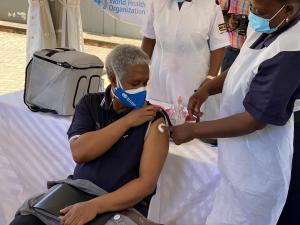Clarification on the COVID-19 Vaccine Allergies
WHO wishes to clarify on an article that appeared in The Observer Newspaper and on its online platform https://observer.ug/news/headlines/68815-allergic-persons-advised-not-t… under the title: “Allergic person advised not to take COVID-19 vaccination”.
WHO is aware that a small fraction of people – around one person in every one million people vaccinated— may have a severe allergic reaction to the COVID-19 vaccines, known as anaphylaxis.
Just like any other vaccine or drug, some people, especially those with a history of anaphylaxis to one of the vaccine constituents have a higher risk of reaction following COVID-19 vaccination. Similarly, if the person provides a history of anaphylaxis with a previous dose of the same vaccine he or she advised not to take the vaccine.
To manage such cases, WHO advises that all vaccination sites should have a medical doctor or clinical officer with the necessary kit to address such reactions or any other adverse event following vaccination.
WHO recommends that before the first dose, clients should inform the vaccinating team about any allergic reaction they may have had in the past. This is a precautionary measure. The healthcare providers will then assess the patient’s medical history to determine if he or she is at risk of a severe allergic reaction to a COVID-19 vaccine. All immunization providers are trained to recognize severe allergic reactions and are knowledgeable about the practical steps needed to treat them. We encourage all those who are vaccinated to remain at the vaccination site for 30 minutes for observation.
During the on-going COVID-19 rollout, WHO is working closely with the Ministry of Health to detect and immediately respond to any serious side effects that may occur within 30 minutes of vaccination and beyond the 30 minutes when the person goes home.
The same article reports that some European countries have suspended the rollout of the AstraZeneca vaccine based on reports of rare blood coagulation disorders in a few people. WHO is aware that as a precautionary measure, a few countries in the European Union have suspended the use of a specific batch as a precaution while a full investigation is undertaken. It is important to note that the European Medicines Agency’s Pharmacovigilance Risk Assessment Committee position is that the vaccine’s benefits continue to outweigh its risks, and the vaccine can continue to be administered while investigation of cases of thromboembolic events is ongoing.
As soon as WHO gains a full understanding of these events surrounding the suspension of AstraZeneca vaccine in those countries, the findings and any changes to current recommendations will be immediately communicated to the public.
It is important to note that vaccinations against COVID-19 will not reduce other medical conditions or deaths from other causes. They will continue to occur, including after vaccination but they are not related to the vaccines.
In the African Region, as of 12 March, around 14.5 million doses of AstraZeneca produced by the Serum Institute of India have been delivered to 23 African countries under the COVAX initiative. Nearly 600,000 doses of COVAX-funded AstraZeneca vaccine have been administered.
WHO is supporting countries to monitor and report any adverse events following COVID-19 vaccines as part of their vaccination strategies, and is currently working on setting up a regional database for shared data. To date, no serious adverse events related to any COVID-19 vaccines have been reported.
With the generous contribution of the COVAX initiative, Uganda received 840,000 doses of the AstraZeneca vaccine and another 100,000 doses from the Government of India. These donations kick-started the rollout of the vaccine in the country with the Minister of Health Dr Jane Ruth Aceng being the first person in the country to receive the vaccine.
Health workers, teachers, security personnel, people aged above 50 years and those below fifty with underlying health conditions are being prioritized for vaccines. An additional 2,688,000 doses are expected in the country by June this year. These will enable cascading the vaccination to other Ugandans in a phased manner until 49.6% of the population is covered.
WHO appeals to all eligible Ugandan to get vaccinated as this is one of the giant steps towards controlling the COVID-19 outbreak. The AstraZeneca vaccine, which was invented by the University of Oxford, UK, and the Vaccitech Company, manufactured by the Serum Institute of India and approved by WHO for Emergency Use Listing is safe and efficacious.
The AstraZeneca vaccine is suitable for Uganda and other countries as it can be stored, transported, and administered using available resources in the country such as fridges and the cold chain used for other vaccines.
It is important to note that the COVID-19 vaccination must go together with the continued implementation of the well-known public health measures for COVID-19, that is regular and consistent wearing of masks in public, washing hands with soap and water and physical distancing.
Health Promotion Advisor
Tel. : +256 414 335505
Cell: +256 772 507906
Email: sensasib [at] who.int
Public Information Officer
Tel. : +256 313 335569
Cell: +256 786 497073
Email: mwebembezie [at] who.int




